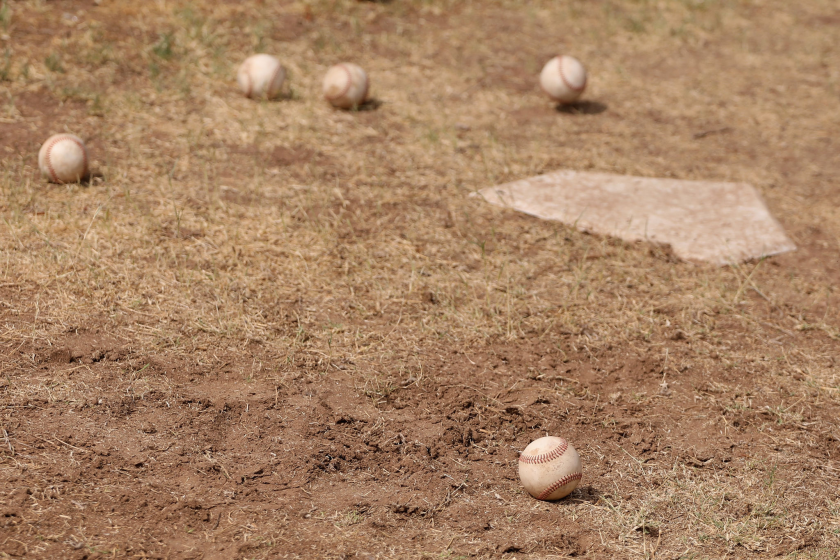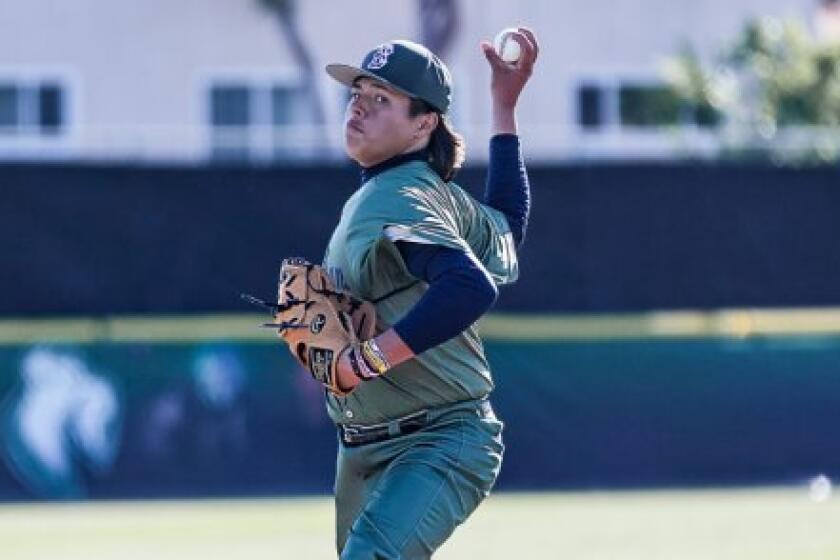TENNIS / THOMAS BONK : U.S. Davis Cup Team: Survival of the Unfittest
- Share via
Expect the United States Tennis Assn. to finally name its Davis Cup team this week, which is pretty good timing, because the first-round match at Mexico begins the weekend after next.
Why the wait? Well, the USTA actually named its squad in late December--Andre Agassi and Aaron Krickstein to play singles, Rick Leach and Jim Pugh to play doubles. Then the Persian Gulf War broke out and the U.S.-Mexico first-round match was rescheduled for March 29-31.
There have been other factors:
--Agassi tore muscles in his side during the Davis Cup final against Australia and missed 2 1/2 months.
--The rescheduled first-round match against Mexico conflicts with a charity event to which Agassi has committed.
--Krickstein has ankle and elbow injuries.
--Suitable experienced replacements, Brad Gilbert and Jay Berger, both are injured.
--Suitable inexperienced replacement Pete Sampras is injured.
--Suitable experienced replacement Michael Chang has a schedule conflict.
--John McEnroe is on the outs with the USTA and Capt. Tom Gorman and will not be asked.
“Right now, we’re like a M.A.S.H. unit,” Gorman said.
So where does that leave the U.S.? Unless Agassi can be talked into playing, there are reports that the U.S. singles players named could be a real stunner.
Are you ready for Jim Courier and Patrick McEnroe?
Money matters: The USTA released its financial report from its 1990 Davis Cup victory--$992,972. Each player’s share was based on the times a player played plus a $20,000 guarantee from the USTA for each match.
The doubles team of Leach and Pugh, who played all four matches, earned $209,835 apiece.
Agassi, Chang and Gilbert played two matches and earned $112,130, and Berger and Krickstein played one match and got $48,400.
Gorman’s share was $68,852. The balance was divided between the medical staff and practice partners.
Becker watch: Out for four weeks because of a thigh injury, Boris Becker is back in action in Key Biscayne, but there has been plenty of action off court.
After Becker’s manager, Ion Tiriac, announced that Becker and his Australian coach, Bob Brett, were parting, Germany’s Davis Cup coach, Niki Pilic, said he had been asked by Becker to take over.
Then, in a German magazine article, Becker wrote that he had once, fleetingly, thought of suicide.
“The brutal thing in my life is that I am famous 24 hours a day,” he wrote in the article for Sports magazine. “For me there is no end of work, I have no break, my job lasts around the clock. I am free only when I am enclosed in my (hotel) room. That’s the only time when no one speaks to me, when no one takes a picture of me.”
Becker also said that the second-round loss to Peter Doohan at Wimbledon in 1987 changed his life.
“It made me into another person,” Becker wrote. “I changed from Becker the market product to Becker the guy.”
Still, after he had experienced a streak of defeats in 1987, Becker wrote that he once stood in front of an open window.
“One more step and I would have fallen,” he said.
But Becker said he closed the window and “put everything behind me and made a new start.”
Becker is 23.
Don’t listen: It sounds as if Jennifer Capriati may be talked into a slump.
“The sophomore year is always hard for everybody,” Gigi Fernandez told the Associated Press. Fernandez has played doubles with Capriati and lost to her last week at the Virginia Slims of Florida in Boca Raton.
“She’s going to start feeling the pressure now, because it’s the second year. It happens to everybody.”
Capriati reached the semifinals at Boca Raton before losing to Gabriela Sabatini, who pointed out a few weaknesses in Capriati’s game.
“She has to improve her serve,” Sabatini said. “Last year it was a little better. And she should probably try to come to the net a little more. But she has some very good shots from the baseline. There she’s very solid.’
Steffi Graf said Capriati should guard against elevated expectations.
“Now people expect much more out of her than they did at the beginning, because she started out so well,” Graf said. “It will be more difficult the next one or two years, but I think she has the mental strength to go through with it. She really has so much potential.”
Capriati turns 15 March 29.
Numbers game: Just to keep you up to date, here is the latest on the women’s rankings, depending on what happens in the Lipton International Players Championships. If No. 2 Steffi Graf wins the tournament and No. 1 Monica Seles loses before the final, Graf will regain her No. 1 ranking.
And war isn’t: Capriati is wearing a earring with a peace sign on her left ear. Why a peace sign?
“It’s not political,” she said. “It’s the ‘in’ thing. I want peace--it’s cool.”
Tennis lesson: In San Antonio, Tex., Trinity University’s 30-year history of top college tennis will end next fall when the school drops from NCAA Division I to Division III, which prohibits athletic scholarships.
Trinity teams, which have won 77% of their matches, probably will not add to their impressive list of pros because the change means that top players simply will not go to school there.
Trinity graduates include 1972 NCAA singles champion Dick Stockton, 1963 Wimbledon Champion Chuck McKinley and 1976 NCAA singles champion Bill Scanlon. Eric Iskersky and Ben McKown teamed to win the NCAA doubles championship in 1979. Karen Hantze Susman won Wimbledon singles and doubles titles in 1961. Gretchen Rush Magers, Anne Smith and Jo Anne Russell played at Trinity.
More to Read
Go beyond the scoreboard
Get the latest on L.A.'s teams in the daily Sports Report newsletter.
You may occasionally receive promotional content from the Los Angeles Times.










